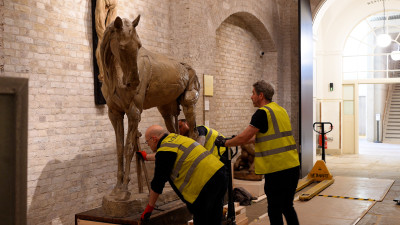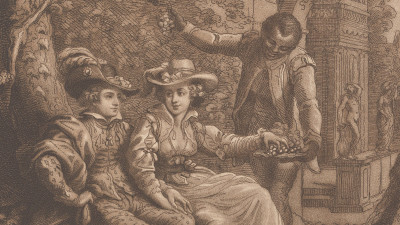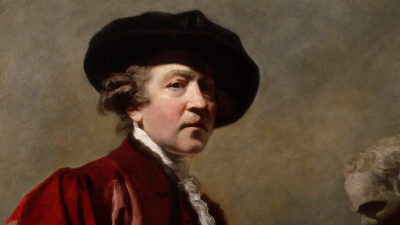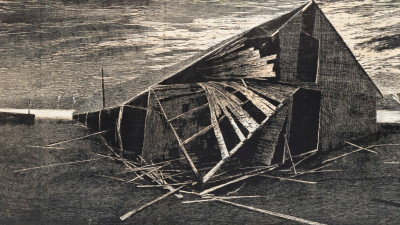
George Frederic Watts RA, Compositional study for 'Earth', c. 1856.
Pen and ink over pencil on cream wove paper. 213 mm x 336 mm. © Photo: Royal Academy of Arts, London.
This image is not available to download. To licence this image for commercial purposes, contact our Picture Library at picturelibrary@royalacademy.org.uk

George Frederic Watts RA, Compositional study for 'Earth', c. 1856.
Pen and ink over pencil on cream wove paper. 213 mm x 336 mm. © Photo: Royal Academy of Arts, London. Photographer: John Hammond.
This image is not available to download. To licence this image for commercial purposes, contact our Picture Library at picturelibrary@royalacademy.org.uk
Compositional study for 'Earth', c. 1856
George Frederic Watts RA (1817 - 1904)
RA Collection: Art
A pen and ink compositional drawing for 'Earth', a fresco painted by Watts for Earl and Lady Somers at 7 Carlton House Terrace (c.1856). This drawing for the central group is probably slightly earlier than a related drawing in the RA Collection (RA 04/70) as the latter is closer to the composition of the finished fresco. Here, the pose of the central female figure is slightly less upright and the two figures to her left are completely different.
The outline style and sinuous forms of this drawing suggest the influence of John Flaxman, whose illustrations Watts admired. He described Flaxman's outline illustrations to Homer not only 'extremely beautiful and very interesting to the student' but also 'admirably adapted for mural decoration', suggesting that art students should be allowed to paint murals based on the designs in public spaces.
Watts was commissioned by Earl Somers to paint a series of frescoes and chose to represent the Elements through Greek mythological subjects. The 'Earth' mural is also known as 'Bacchus and Ariadne' because the central figure and general composition is based on Titian's canvas of the same name. The female figure on the right is a variation on a type which also features in 'A Scene from Boccaccio' (c. 1844-7, Tate Britain) and 'Orlando Pursuing the Fata Morgana' (c. 1848, Leicester Museum and Art Gallery and other versions). The woman on the left, standing with a man playing pipes, is reputed to be a portrait of Lady Somers.
It may seem odd that Watts should make such small compositional drawings for a work which was very large but according to Mary Seton Watts, the artist's wife, in preparing his fresco at Lincoln's Inn, 'Justice; A Hemicycle of Lawgivers' (finished 1859) Watts often used small-scale drawings. She stated that he preferred 'to work without having made any cartoon,...[he] made drawings, sometimes on so small a scale that the whole composition went into half a sheet of notepaper; no study seems to have been larger than a medium-sized sheet of drawing-paper could carry'.
The frescoes themselves were rediscovered during the 1930s when the Carlton Terrace house was in use as part of the German embassy. 'Earth' is now at Malvern College, Worcestershire, and the other frescoes are at 16 Carlton House Terrace, the office of the Crown Estates Commissioners.
Further reading:
Mary Seton Watts, George Frederic Watts: The Annals of an Artist's Life, London 1912, Vol I, p. 162-3 and p. 150-1
Clare Willsdon, Mural Painting in Britain, 1840-1840 - Image and Meaning, Oxford, 2000, p. 310-315, and 317
Object details
213 mm x 336 mm
Start exploring the RA Collection
- Explore art works, paint-smeared palettes, scribbled letters and more...
- Artists and architects have run the RA for 250 years.
Our Collection is a record of them.



